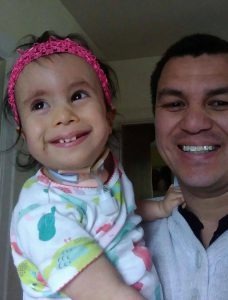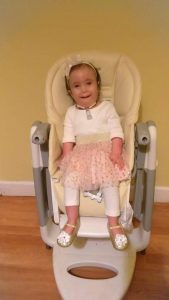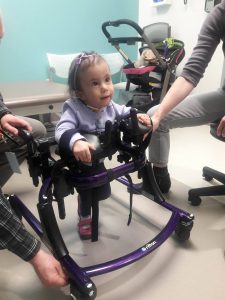
Josie came to Seattle Children’ Emergency Department when she was 2 months old after acquiring a virus and going into respiratory distress. She was also in the beginning stages of heart failure.
Statistically, she was lucky to have made it that far.
Before birth, Josie was diagnosed with Trisomy 18, a life-threatening condition caused by an extra chromosome that disrupts the typical pattern of development in significant ways. Only about 5 to 10% of children with Trisomy 18 survive beyond their first year of life.
“I didn’t expect her to live that long,” said Josie’s mother, Jenny Castillo. “I hoped we would at least have a few days or weeks with her, and we’ve been thrilled with all the time we’ve had.”
In search of answers for Trisomy 18
After receiving the news that Josie had Trisomy 18, Castillo scoured the internet for information about kids with the condition and their outcomes.
“There is limited clinical research about Trisomy 18,” said Dr. Ben Wilfond, director of the Treuman Katz Center for Pediatric Bioethics at Seattle Children’s Research Institute. “Many providers haven’t encountered it and in some textbooks, it is still described as an ‘incompatible with life’ diagnosis.”
In her research, Castillo found the Support Organization for Trisomy (SOFT), which keeps a database of parent-reported surgeries and procedures. There are also a number of SOFT Facebook groups, where Castillo discovered a tight-knit community of parents sharing their kids’ medical histories, therapies, diets and more.
Josie’s family was already having care conferences, a common practice for medically complex patients where families meet with their child’s providers to discuss treatment options and the family’s unique needs and wishes. Castillo was pushing for interventions for Josie with the hopes of bringing her home as soon as possible. Specialists involved in Josie’s care were concerned she may be too weak to handle interventions like a tracheostomy and pulmonary artery band surgery that statistically speaking, may not improve her prognosis.
“Everyone wanted the best for Josie, but what kind of life would she have if she survived surgery? Was she big enough? Was she strong enough to handle these interventions?” Castillo said.
Castillo sought a bioethics consultation, which she had learned about through other parents of children who had Trisomy 18.

Advancing the discussion for Josie’s care
Seattle Children’s bioethics consultants help providers and parents reach a consensus on a course of treatment that best aligns with the health of the patient, standards of care and the wishes of the patient and family. They offer advice and recommendations but do not make decisions.
“In bioethics, we facilitate and utilize open conversations in difficult situations to discover shared values and goals, and come up with a plan everyone is comfortable with,” Wilfond said.
Wilfond, who is a pulmonologist in addition to being a bioethicist, is uniquely qualified to talk about Trisomy 18. In 2012, Wilfond was a co-investigator for a study that surveyed parents participating in Trisomy 18 Facebook groups to find out how they felt about their kids’ health and the care they were receiving. In the results, published in Pediatrics, parents describe their kids being much happier than doctors believed them to be capable of.
The discussions examined various aspects of Josie’s case and emerging Trisomy 18 outcomes that helped both the care team and her parents move forward with interventions to get Josie home with her family as soon as possible.

Josie beats the odds
Josie had her full heart repair a year ago and no longer needs to see a cardiologist beyond a yearly check-in. Last October, she moved off of her ventilator completely and will have her tracheostomy tube taken out, pending a sleep study and evaluation of her airway.
Today, Josie is 2 1/2 and is learning to walk. She is starting to use sign language and gives high fives, kisses and hugs.
“It doesn’t matter to our family and friends that Josie is developmentally delayed,” Castillo said. “She is a loving and social child. What she contributes to the world is her joy and resilience, and we celebrate every small milestone.”
For more information, please visit Seattle Children’s Bioethics webpage.
Resources:
- The trisomy 18 syndrome – National Institutes of Health
- The Experience of Families With Children with Trisomy 13 and 18 in Social Networks – Pediatrics

